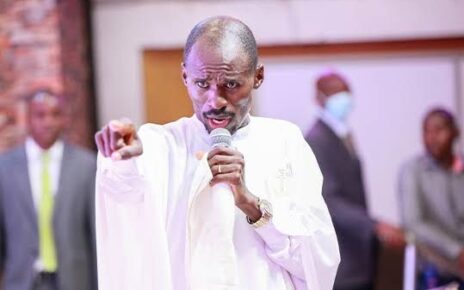Controversial political activist Nuru Okanga has once again captured public attention after making his will public in an emotional message that left many Kenyans talking. Speaking during a recent address, Okanga expressed his frustrations and deep sense of loneliness following the passing of ODM leader Raila Amolo Odinga, a man he has long admired and supported. “Mimi nimeachwa kwa mikono mbaya. Wakenya, ile siku mtasikia nimeenda, pia mimi mnizike within 72 hours kama Baba,” he declared, referring to Raila Odinga’s burial that took place three days after his death.
Okanga’s statement was both emotional and symbolic. For years, he has positioned himself as one of Raila’s most loyal foot soldiers, passionately defending him in public rallies and media appearances. To him, Raila was not just a political icon but also a father figure and source of inspiration. The tone of his message revealed a man struggling to come to terms with Raila’s death, and at the same time, preparing for his own inevitable fate. By making his final wishes public, Okanga seemed to be communicating a deeper message about loyalty, mortality, and the pain of losing someone he deeply admired.
Nuru Okanga’s declaration also reflects the emotional bond many of Raila’s supporters shared with the veteran politician. For decades, Raila stood as a symbol of hope and resistance for millions of Kenyans, particularly the youth and the marginalized. Okanga’s sentiments mirror the collective grief among Raila’s loyal followers, many of whom feel politically and emotionally orphaned. His statement that he has been “left in bad hands” suggests a lack of confidence in the current political leadership and uncertainty about the future of the movement Raila built.
Beyond the emotion, Okanga’s message also carries cultural and political undertones. In many African traditions, making one’s burial wishes public is seen as a sign of closure and self-awareness. By asking to be buried within 72 hours, Okanga might have been expressing his desire to emulate Raila’s humility and dignity, even in death. It also highlights his belief that Raila’s passing marked the end of an era—one that deeply defined his own identity and purpose.
Reactions to Okanga’s statement have been mixed. Some Kenyans sympathized with him, describing his emotional expression as a genuine reflection of love and loyalty to Raila Odinga. Others, however, viewed it as overly dramatic, arguing that he should focus on continuing Raila’s legacy through action rather than emotional declarations. Nonetheless, few can deny the sincerity and raw emotion in his words.
Nuru Okanga’s decision to publicly reveal his burial wishes speaks volumes about the depth of his admiration for Raila Odinga and the sense of loss that many of Raila’s supporters continue to feel. His statement, though emotional, reflects a broader national mood of mourning and uncertainty following the passing of one of Kenya’s most influential political figures. Whether Okanga’s sentiments will inspire others to carry forward Raila’s legacy or simply fade as a moment of grief remains to be seen—but his message will certainly be remembered as one of the most heartfelt tributes to the man he called “Baba.”



